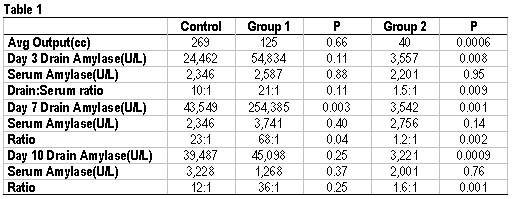# 100900 Abstract ID: 100900 Application of a New Collagen Based Sealant for the Treatment of Pancreatic Injury
Michael Rosen, Richard Walsh, Cleveland, OH
Pancreatic injury is the most frequent serious morbidity which can occur following laparoscopic splenectomy.The presumed mechanism of injury is direct trauma to the pancreas during hilar dissection or transection with endovascular staplers.It was our aim to study the direct application of topical sealants to a pancreatic injury to prevent a pancreatic leak.A porcine model of pancreatic injury in a normal pancreas was developed.14 animals underwent subtotal (8 cm) distal pancreatectomy. The pancreas was sharply divided and minimal cauterization utilized.A JP drain was secured to the pancreas in all animals.The control group (N=7) underwent no further treatment.Two groups underwent treatment with a sealant. Group 1(N=3) had a hydrogel applied to the pancreatic remnant.Group 2(N=4) had a biodegradable sealant of polyethylene glycol-collagen formulation applied by aerosol.During the postoperative period, animals were fed 2.2 lbs/day of a high fat(10%lard) diet to stimulate pancreatic exocrine function.Total daily drain outputs were recorded and drain amylase content and serum amylase concentration were measured on postoperative days 3,7, and 10.Animals were sacrificed on day 10 and explored for undrained fluid collections.Control and treatment groups were compared using repeated measures ANOVA of log-transformed data.All animals survived until elective necropsy, and results are summarized in Table 1. In group 1, average total drain outputs were not significantly less than the controls. The mean drain/serum amylase concentration on days 3, 7, and 10 were not significantly different from the control group.Group 2 had significantly less overall average drainage output than controls.Furthermore, group 2 had a significant reduction in pancreatic leaks on days 3, 7, and 10 as measured by mean drain/serum amylase concentration. No undrained fluid collections were identified at autopsy.Based on our experimental porcine model, a novel collagen based, biodegradable hydrogel can prevent a ductal leak following pancreatic injury.

|
 500 Cummings Center
500 Cummings Center +1 978-927-8330
+1 978-927-8330
 +1 978-524-0461
+1 978-524-0461